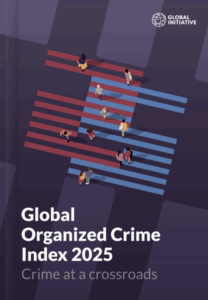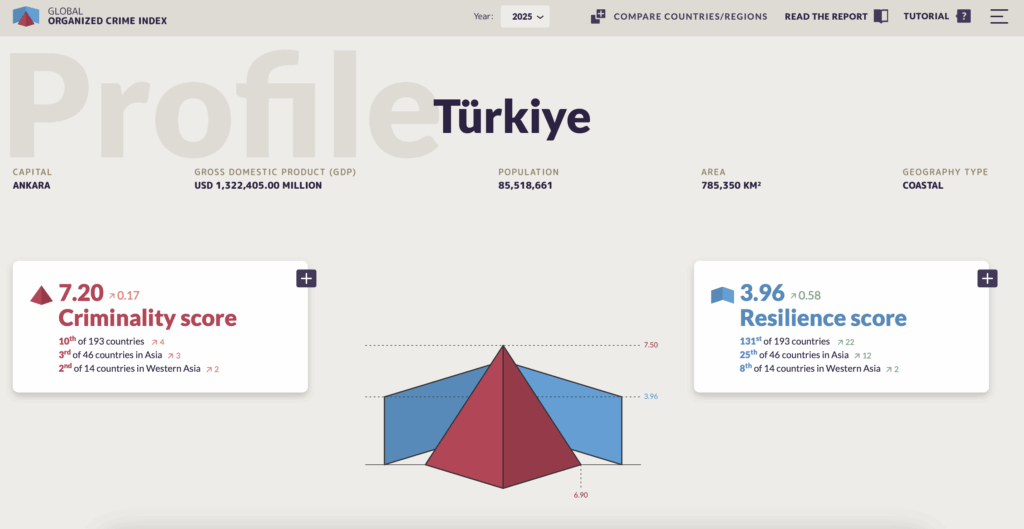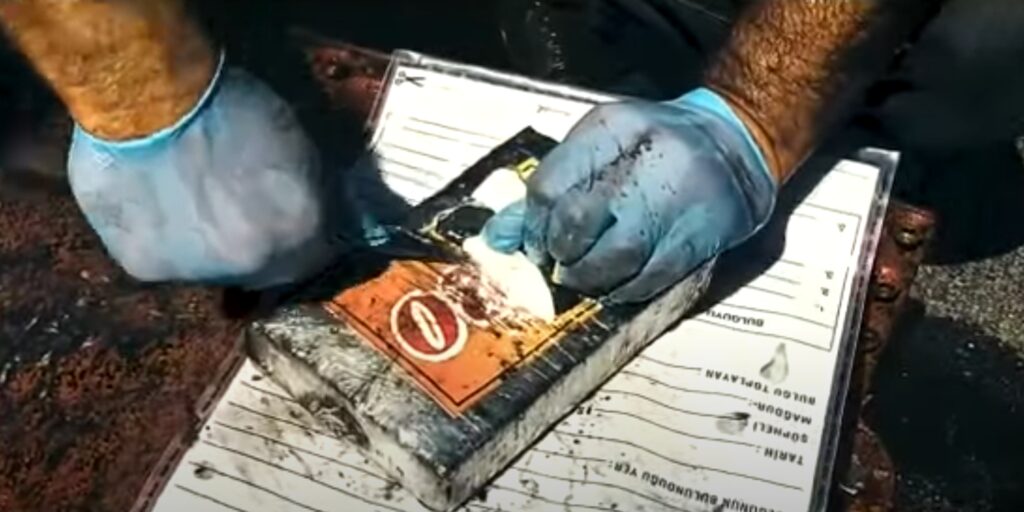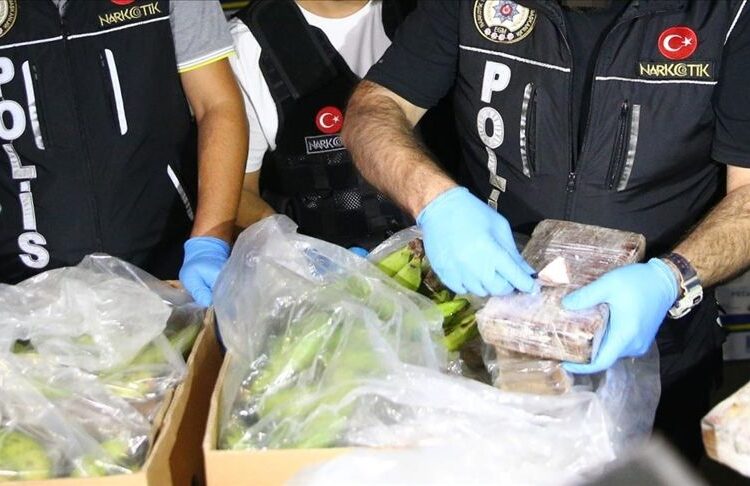Levent Kenez/Stockholm
Turkey is emerging as a critical link in global cocaine trafficking routes between Latin America and European, Russian and Caucasian markets while ranking among the countries with high levels of organized crime and limited resilience, according to the Global Organized Crime Index 2025 released by the Geneva-based Global Initiative Against Transnational Organized Crime on November 10, 2025.
The 2025 index assigns Turkey a criminality score of 7.20, placing it 10th among 193 countries, third in Asia and second in Western Asia, reflecting a deterioration compared to 2023. Ranking among the top 10 means Turkey is among the countries with the highest levels of organized crime worldwide. The country’s resilience score stands at 3.96, ranking 131st globally, 25th in Asia and eighth in Western Asia. The index measures criminality through the presence of 15 illegal markets and the influence of organized crime groups, while resilience reflects a country’s capacity to counter them through governance, justice and civil society.
According to the report on Turkey, released together with the index data, the country remains a key corridor for heroin originating in Afghanistan and moving to European markets along the Balkan route. Although heroin seizures have declined since 2022, significant quantities continue to be intercepted. Kurdish and Syrian groups dominate this market, with increasing involvement from foreign networks.
The report also mentions Turkey’s growing role in the global cocaine trade, acting as a bridge between Latin America and European, Russian and Caucasian markets. Turkish mafia-style organizations cooperate with Latin American cartels while some state-linked individuals have been associated with trafficking networks.
Cannabis cultivation and trafficking are widespread, particularly in southeastern provinces such as Diyarbakır and Bingöl. Cannabis remains the most consumed drug domestically, and profits are linked to various criminal organizations including the outlawed Kurdistan Workers’ Party (PKK).
Synthetic drug trafficking, especially Captagon and methamphetamine, has expanded rapidly. Turkey serves as both a transit and limited destination country, with seizures along the Syrian border and in Istanbul. Iranian groups have been frequently implicated in methamphetamine production in Turkish cities.

The report also points out that Turkey’s role in organized crime extends beyond drug trafficking, encompassing human trafficking, arms and counterfeit goods smuggling, financial crimes and cyber-enabled fraud as well as environmental and resource-related offenses.
Human trafficking in Turkey remains a major concern. The country serves as both a destination and a transit center, with most victims being foreign nationals including Syrians, Uzbeks, Afghans and Kyrgyz. Exploitation takes forms such as forced labor, sexual abuse and forced marriage. Syrian women and girls are particularly vulnerable in border areas. Reports also cite organ trafficking and exploitation through sham marriages.
Turkey continues to be a key route for migrant smuggling, driven by its strategic location and large refugee population. Smuggling persists along the eastern Mediterranean and Western Balkan routes, and an increasing number of Turkish nationals attempt irregular entry into the European Union. Networks have expanded transnationally, involving groups from Syria, Central Asia and Africa. Despite enforcement efforts, migrants face exploitation, violence and inflated smuggling fees.
Extortion has re-emerged amid economic challenges. Organized crime groups target indebted individuals and legitimate businesses, often using threats and violence. Some groups reportedly use private security companies to carry out intimidation in nightlife and entertainment venues.
Turkey also plays a significant role in the global illegal arms trade, acting as a source, transit and destination country. Weapons of Turkish-origin have been trafficked to Europe, Africa and South America. Domestically, illegal firearm possession contributes to rising gun violence. Authorities have seized tens of thousands of unregistered weapons, including those from illegal gun factories.
The report identifies Turkey as one of the world’s leading sources and distribution centers for counterfeit goods, including apparel, pharmaceuticals, electronics and cosmetics. Domestic demand has increased due to inflation and poverty. Counterfeit products are sold in urban and tourist markets and online. Despite periodic enforcement operations, the market remains resilient.
Financial crimes including fraud, embezzlement and tax evasion are widespread. High-profile cases have involved public officials and business figures. A 2024 investigation uncovered a healthcare fraud network using infant patient records to claim false social security payments.

from one of the dozens of plastic-wrapped bags which were extracted from a metal container attached to the hull of a Chinese freighter that was transporting coal, according to its manifest.
Cyber-enabled financial crimes such as phishing and identity theft are rising. The use of unlicensed software and online piracy has made Turkey vulnerable to ransomware and malware attacks. Both domestic and foreign cyber groups operate in the country, including individuals trained in Russia.
Mafia-style organizations in Turkey have evolved into decentralized networks active in multiple illegal markets ranging from drug trafficking and human smuggling to online gambling and extortion. More than two dozen groups operate nationwide, and alliances among Istanbul-based figures shape the criminal landscape.
The report notes persistent allegations of connections between organized crime and state-embedded figures. Officials have been cited in reports for alleged involvement in smuggling, narcotics, arms and counterfeit trade as well as for accepting bribes at border crossings. Despite public scrutiny, accountability remains limited.
Foreign criminal organizations from the Balkans, Russia, Central Asia and Latin America are also active in Turkey, exploiting its strategic geography and financial system.
The index describes Turkey’s political environment as highly centralized, with a strong executive role and limited institutional balance. While the government has increased its focus on combating organized crime, observers raise concerns over civic freedoms and declining democratic standards.
Corruption and weak transparency are persistent problems. Although legal frameworks for accountability exist, enforcement remains inconsistent. Procurement and public spending are cited as vulnerable to mismanagement and bribery. Anti-corruption investigations are rare, and public trust in institutions is low.
The judiciary’s independence and capacity are identified as key concerns. Political interference and inconsistent rulings undermine confidence in legal institutions. Overcrowded prisons, poor conditions and limited investigations into mistreatment further weaken credibility.
Law enforcement agencies are well-equipped and have conducted large-scale operations against organized crime groups, yet challenges remain in handling complex crimes such as human trafficking. Reports of police violence and corruption continue. Border corruption, especially along the Turkish–Iranian frontier, facilitates illicit trade despite international cooperation.
Turkey’s removal from the Financial Action Task Force grey list in 2024 is cited as a positive step toward compliance with global anti-money-laundering standards. Still, vulnerabilities persist due to illicit financial flows from drugs, smuggling and fuel trafficking.
Economic instability driven by inflation, currency depreciation and informal markets continues to facilitate organized crime. Weak regulatory enforcement and perceived inequality in the justice system further erode trust.
Restrictions on civil society and media freedom further complicate efforts to combat organized crime in Turkey. According to the report, media outlets operate under strong state influence, and journalists reporting on corruption or crime face censorship or prosecution. A law criminalizing what authorities define as “disinformation” has been used to silence government critics and restrict opposition voices, especially during election periods.












